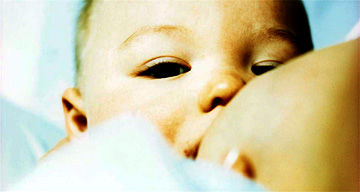
Breastfeeding your baby has little or no effect on its intelligence, the largest study ever conducted on the issue reveals today.
For almost 80 years research has found that children who are breastfed have higher IQs than those fed formula or cow's milk, leading to the belief that breast milk confers intelligence. But the new study suggests the reason could be simpler: breast-fed babies are smarter because their mothers are more intelligent. Higher levels of education and stimulating home environments also have an effect.
The study, conducted by the Medical Research Council and the University of Edinburgh, analysed data from 5,475 children and 3,161 mothers in in the US, collated from the US national longitudinal study of youth, 1979. The researchers looked at numerous factors including whether a child was breastfed, the home environment, socio-economic status and maternal intelligence, race and education.
The findings showed that breastfeeding appeared to benefit a child's intelligence when considered in isolation. But as soon as factors including maternal intelligence, home environment and IQ were considered, breastfeeding made less than half a point's difference to a child's intelligence. That difference is viewed by scientists as so small as to be insignificant. "It's absolutely minuscule," said Geoff Der, a statistician from the Medical Research Council's social and public health sciences unit, who led the study.
Further research, comparing data on siblings in the sample group - one of whom had been breastfed and the other not - backed the finding by showing there was no difference in their intelligence. "Breastfeeding has little or no effect on intelligence in children," says the research, published by the British Medical Journal online. "While breastfeeding has many advantages for the child and mother, enhancement of the child's intelligence is unlikely to be among them."
The researchers did find a direct link between the mother's intelligence and the likelihood she would breastfeed, however. An increase of 15 IQ points in the mother's intelligence score more than doubled her chance of breastfeeding - meaning that a mother with an IQ of 115 was more than twice as likely to breastfeed as one with the average IQ of 100. Education played almost as big a part in determining if women breastfed, and mothers who breastfed were also likely to be older, more educated, more financially secure and to provide a more stimulating home environment.
In Britain 76% of women start breastfeeding but only 28% persist until their child is four months - despite the Department of Health advising that women refrain from giving formula milk until their baby is six months. Younger, less well-educated and poorer women are less likely to breastfeed.
Mr Der said: "The fact that there are big differences between women who breast feed and those who don't is well established. What wasn't clear was whether the background of the mothers who breastfed and the family circumstances was sufficient explanation for the apparent difference in the IQs. We've found that it is. Intelligence is determined by factors other than breastfeeding. Breastfed babies are smarter because their mums are clever."
But Rosie Dodds, policy researcher at the National Childbirth Trust and a breastfeeding counsellor, said research published last year from the Philippines, where poorer women breastfeed, suggested a link between breast milk and intelligence. Children breastfed for longer scored higher in intelligence tests when aged 8 and 11.
Further research by University College London, published last month, suggests babies who are never breastfed are 50% more likely to reach developmental milestones late, than those breastfed exclusively to four months - and attributes this to "some component(s) of breast milk or feature of breastfeeding" rather than having a brighter mother. Another study suggests that premature babies - who have different nutritional requirements than full term babies - saw their IQ rise by five points if they received breast milk. Such babies were excluded from the new research. Mr Der said the researchers did not seek to denigrate breastfeeding, which was "definitely the smart thing to do".
Ian Deary, a psychologist from the University of Edinburgh, said other studies had taken the mother's education into account but the new study confirmed the need to examine IQ.
FAQ: Breastfeeding
Why is breast best?
Breastfeeding eases the baby's transition to the world, aids bonding, and boosts immunity. Other benefits include: halving the risk of respiratory infections up to the age of seven; reducing the risk of diarrhoea, asthma, eczema and allergies, bacterial meningitis, insulin-dependent diabetes, and ear infections. Breastfed babies are also less likely to be obese because they regulate how much food they need - and babies who are breastfed longer are less likely to be obese in later life. Breastfeeding provides some maternal protection against breast and ovarian cancer.
So why doesn't everyone do it?
Embarrassment; lack of support from family or midwives; and pain if the baby doesn't "latch on" properly or the mother develops mastitis - inflammation of the breast that may require antibiotics. Going back to work often means it stops.
Who does it?
Although 76% of mothers start breastfeeding, older women in higher economic groups are more likely to breastfeed: 88% of professional women start, compared with 65% in manual jobs.
What's the official advice?
The Department of Health advises women to breast feed exclusively - ie not give their babies formula milk or food - until they are six months old. The World Health Organisation advises breastfeeding "up to two years and beyond".

